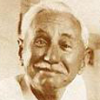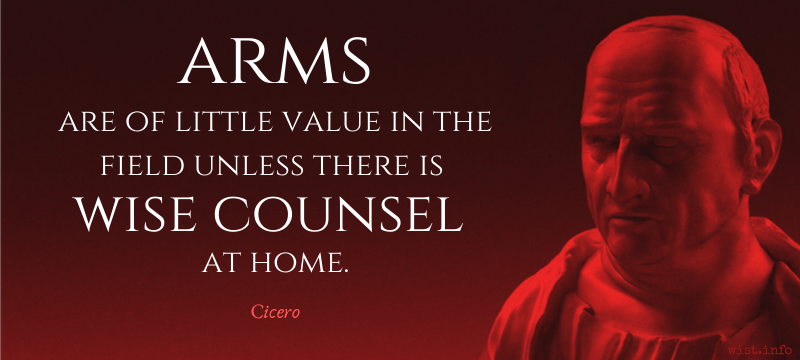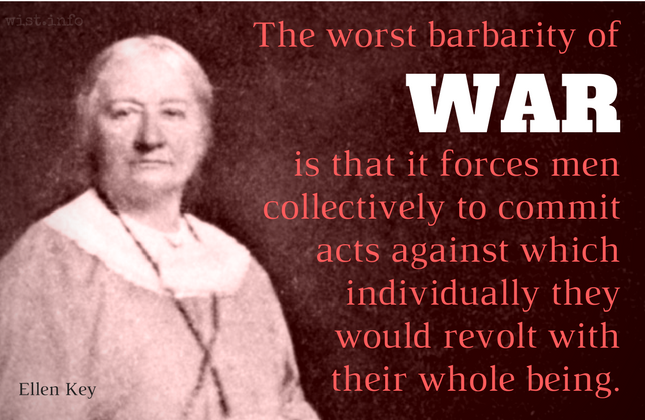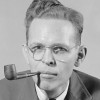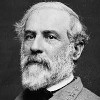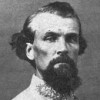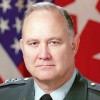I do not think military readiness, in itself, will defeat Communism. I do not think we can consider the job finished with that. I think it buys us time to do the bigger job. We must demonstrate that it is possible to overcome poverty, misery and decay by democratic means, and that we must ourselves believe, and must show others, that our American tradition of the dignity and liberty of the individual is not a luxury for easy times but is the basic source of strength and security of a successful society.
Jane Jacobs (1916-2006) American-Canadian journalist, author, urban theorist, activist
“No Virtue in Meek Conformity” (1952)
(Source)
Foreword to her response to a State Department Loyalty Security Board interrogatory (1952-03-25). Reprinted in Vital Little Plans (2016).
Quotations about:
military
Note not all quotations have been tagged, so Search may find additional quotes on this topic.
In fact the state is primarily an organization for killing foreigners, that’s its main purpose. There are, of course, other things they do. They do a certain amount of educating, but, in the course of educating you, try very hard to make the young think it is a grand thing to kill foreigners.
Bertrand Russell (1872-1970) English mathematician and philosopher
Interview by Woodrow Wyatt, BBC TV (1959)
Collected in Bertrand Russell's BBC Interviews (1959) [UK] and Bertrand Russell Speaks His Mind (1960) [US].
History. We want to find moral lessons in it, but its only lessons are of politics, military art, etc.
Joseph Joubert (1754-1824) French moralist, philosopher, essayist, poet
Pensées [Thoughts], 1806 [tr. Auster (1983)]
(Source)
I have been unable to find an analog in other translations, or in the original French.
But if war continues to absorb and dominate it, or if the itch to rule the world requires large military establishment and appropriation, the freedom of democracy may one by one succumb to the discipline of arms and strife. If race or class war divides us into hostile camps, changing political argument into blind hate, one side or the other may overturn the hustings with the rule of the sword. If our economy of freedom fails to distribute wealth as ably as it has created it, the road to dictatorship will be open to any man who can persuasively promise security to all; and a martial government, under whatever charming phrases, will engulf the democratic world.
William James (Will) Durant (1885-1981) American historian, teacher, philosopher
The Lessons of History, ch. 10 (1968) [with Ariel Durant]
(Source)
I agree as to the doubtful value of competitive examination. The qualities which you really want, viz., self-control, self-reliance, habits of accurate thought, integrity and what you generally call trustworthiness, are not decided by competitive examination, which test little else than the memory.
Florence Nightingale (1820-1910) English social reformer, statistician, founder of modern nursing
Letter to Lord Edward Geoffrey Stanley (17 May 1857)
(Source)
Regarding selection processes for military officers. This was undergoing reform during the period, including the radical proposal to prevent people from buying their way into lower officer ranks.
Chickenshit refers to behavior that makes military life worse than it need be: petty harassment of the weak by the strong; open scrimmage for power and authority and prestige; sadism thinly disguised as necessary discipline; a constant “paying off of old scores”; and insistence on the letter rather than the spirit of ordinances. Chickenshit is so called — instead of horse- or bull- or elephant-shit — because it is small-minded and ignoble and takes the trivial seriously. Chickenshit can be recognized instantly because it never has anything to do with winning the war.
Paul Fussell (1924-2012) American cultural and literary historian, author, academic
“Chickenshit: An Anatomy,” Wartime: Understanding and Behavior in the Second World War (1989)
(Source)
Sometimes misattributed to historian Stephen Ambrose, who used part of it (with attribution) in his Band of Brothers (1992).
The great armies, accumulated to provide security and preserve the peace, carried the nations to war by their own weight.
A. J. P. Taylor (1906-1990) British historian, journalist, broadcaster [Alan John Percivale Taylor]
The First World War: A Illustrated History, ch. 1 (1963)
(Source)
There was a price to be paid; the dominion of the seas was not given freely by destiny. The Channel Fleet paid in blood, in lives, as well as in the sacrifice of the freedom and leisure of every officer and man on board. There was a constant petty drain. Ordinary sickness took only small toll; among men in the prime of life isolated from the rest of the world illnesses were few, although it was noticeable that after the arrival of victualling ships from England epidemics of colds would sweep through the fleet, while rheumatism — the sailor’s disease — was always present. The losses were mainly due to other causes. There were men who, in a moment of carelessness or inattention, fell from the yard. There were the men who ruptured themselves, and they were many, for despite the ingenuity of blocks and tackles there were heavy weights to haul about by sheer manpower. There were crushed fingers and crushed feet when ponderous casks of salted provisions were lowered into boats from the storeships and hauled up on to the decks of the fighting ships. And frequently a lacerated limb would end — despite all the care of the surgeons — in gangrene, in amputation, and death. There were the careless men who, during target practice with the cannon, lost their arms by ramming a cartridge into an improperly sponged gun, or who did not remove themselves from the line of recoil. Three times that year there were men who died in quarrels, when boredom changed to hysteria and knives were drawn; and on each of those occasions another life was lost, a life for a life, a hanging with the other ships clustered round and the crews lining the sides to learn what happened when a man lost his temper. And once the crews manned the sides to see what happened when a wretched young seaman paid the price for a crime worse even than murder — for raising his fist to his superior officer. Incidents of that sort were inevitable as the ships beat back and forth monotonously, over the eternal grey inhospitable sea.
C. S. Forester (1899-1966) English novelist [Cecil Scott Forester, pen name for Cecil Louis Troughton Smith]
Hornblower and the Hotspur (1962)
(Source)
The moral case for intervention is only as strong as the practicality of the mission itself. There is no moral case for doing something you’re not capable of doing.
Dexter Filkins (b. 1961) American journalist
“The Moral Logic of Humanitarian Intervention,” New Yorker (16 Sep 2019)
(Source)
We will lead not merely by the example of our power but by the power of our example.
Joe Biden (b. 1942) American politician, US President (2021- ) [Joseph Robinette Biden Jr.]
Inaugural Address (20 Jan 2021)
(Source)
Regarding American foreign relations.
Law never made men a whit more just; and, by means of their respect for it, even the well-disposed are daily made the agents of injustice. A common and natural result of an undue respect for the law is, that you may see a file of soldiers, colonel, captain, corporal, privates, powder-monkeys and all, marching in admirable order over hill and dale to the wars, against their wills, aye, against their common sense and consciences, which makes it very steep marching indeed, and produces a palpitation of the heart. They have no doubt that it is a damnable business in which they are concerned; they are all peaceably inclined. Now, what are they? Men at all? or small movable forts and magazines, at the service of some unscrupulous man in power?
Henry David Thoreau (1817-1862) American philosopher and writer
“On the Duty of Civil Disobedience” (1849)
(Source)
For arms are of little value in the field unless there is wise counsel at home.
[Parvi enim sunt foris arma, nisi est consilium domi.]
Marcus Tullius Cicero (106-43 BC) Roman orator, statesman, philosopher
De Officiis [On Duties; On Moral Duty; The Offices], Book 1, ch. 22 (1.22) / sec. 76 (44 BC) [tr. Miller (1913)]
(Source)
Peabody comments, "A verse, quoted probably from some lost comedy, the measure being one employed by the comic poets." None of the other translators call this out or show the text as separate except Peabody.
(Source (Latin)). Alternate translations:
For armies can signify but little abroad, unless there be counsel and wise management at home.
[tr. Cockman (1699)]
Armies abroad avail little, unless there be wisdom at home.
[tr. McCartney (1798)]
An army abroad is but of small service unless there be a wise administration at home.
[tr. Edmonds (1865)]
Valor abroad is naught, unless at home be wisdom.
[tr. Peabody (1883)]
An army in the field is nothing without wisdom at home.
[tr. Gardiner (1899)]
For weapons have small value abroad unless there is good advice at home.
[tr. Edinger (1974)]
And that comrade
who meets his death and destiny, speared or stabbed,
let him die! He dies fighting for fatherland —
no dishonor there![ὃς δέ κεν ὑμέων
βλήμενος ἠὲ τυπεὶς θάνατον καὶ πότμον ἐπίσπῃ
τεθνάτω: οὔ οἱ ἀεικὲς ἀμυνομένῳ περὶ πάτρης
τεθνάμεν.]Homer (fl. 7th-8th C. BC) Greek author
The Iliad [Ἰλιάς], Book 15, l. 494ff (15.494) [Hector] (c. 750 BC) [tr. Fagles (1990), l. 574ff]
(Source)
Original Greek. Alternate translations:
If any bravely buy
His fame or fate with wounds or death, in Jove’s name let him die.
Who for his country suffers death, sustains no shameful thing,
[tr. Chapman (1611), l. 452ff]
Death is the worst; a fate which all must try;
And for our country 'tis a bliss to die.
The gallant man, though slain in fight he be,
Yet leaves his nation safe, his children free;
Entails a debt on all the grateful state;
His own brave friends shall glory in his fate.
[tr. Pope (1715-20)]
Therefore stand fast, and whosoever gall’d
By arrow or by spear, dies -- let him die;
It shall not shame him that he died to serve
His country.
[tr. Cowper (1791), l. 599ff]
Whichever of you, wounded or stricken, shall draw on his death and fate, let him die; it is not inglorious to him to die fighting for his country.
[tr. Buckley (1860)]
And if there be among you, who this day
Shall meet his doom, by sword or arrow slain,
E’en let him die! a glorious death is his
Who for his country falls.
[tr. Derby (1864)]
If any of you is struck by spear or sword and loses his life, let him die; he dies with honour who dies fighting for his country.
[tr. Butler (1898)]
If so be any of you, smitten by dart or thrust, shall meet death and fate, let him lie in death. No unseemly thing is it for him to die while fighting for his country.
[tr. Murray (1924)]
And if one finds
his death, his end, in some spear-thrust or cast,
then that is that, and no ignoble death
for a man defending his own land.
[tr. Fitzgerald (1974)]
Any historian of warfare knows it is in good part a comedy of errors and a museum of incompetence; but if for every error and every act of incompetence one can substitute an act of treason, many points of fascinating interpretation are open to the paranoid imagination. In the end, the real mystery, for one who reads the primary works of paranoid scholarship, is not how the United States has been brought to its present dangerous position but how it has managed to survive at all.
“We canna just rush in, ye ken.”
A big bearded Feegle raised his hand. “Point ‘o order, Big Man. Ye can just rush in. We always just rush in.”
“Aye, Big Yan, point well made. But ye gotta know where ye’re just gonna rush in. Ye cannae just rush in anywhere. It looks bad, havin’ to rush oout again straight awa’.”
Man is a military animal,
Glories in gunpowder, and loves parade;
Prefers them to all things.Philip James Bailey (1816-1902) English poet, lawyer
Festus, Sc. “A Metropolis – Public Place” [Lucifer] (1839)
(Source)
From the standpoint of a professional military man there is one good thing about revolutions: the opportunities for swift promotion are excellent . . . even if the pay is inclined to be irregular.
The worst barbarity of war is that it forces men collectively to commit acts against which individually they would revolt with their whole being.
Ellen Key (1849-1926) Swedish feminist and writer
War, Peace, and the Future, ch. 6 (1916) [tr. Norberg]
(Source)
We’re poor little lambs who’ve lost our way,
Baa! Baa! Baa!
We’re little black sheep who’ve gone astray,
Baa-aa-aa!
Gentlemen rankers out on a spree,
Damned from here to Eternity.
God ha’ mercy on such as we,
Baa! Yah! Bah!
Nay, number (itself) in armies importeth not much, where the people is of weak courage; for (as Virgil saith) It never troubles a wolf how many the sheep be.
Francis Bacon (1561-1626) English philosopher, scientist, author, statesman
Essays or Counsels Civil and Moral, No. 29 “Of the True Greatness of Kingdoms and Estates” (1612)
(Source)
The wolf reference is actually a common Latin proverb: "Non curat numerum lupus [The wolf doesn't care about the number]," or its longer form "Lupus non curat numerum ovium" [The wolf does not care about the number of sheep.].
Though Bacon explicitly notes the phrase in Virgil's Eclogues, the Latin saying is often attributed to Bacon.
We have been the cowards, lobbing cruise missiles from 2,000 miles away. That’s cowardly. Staying in the airplane when it hits the building, say what you want about it, that’s not cowardly. Stupid maybe, but not cowardly.
War is a grim, cruel business, a business justified only as a means of sustaining the forces of good against those of evil.
Dwight David Eisenhower (1890-1969) American general, US President (1953-61)
United War Fund appeal (11 Sep 1945)
(Source)
It was not the absence of intelligence which led us into trouble but our unwillingness to draw unpleasant conclusions from it.
There is a reason you separate military and the police. One fights the enemies of the state, the other serves and protects the people. When the military becomes both, then the enemies of the state tend to become the people.
But finally, there is one other quality I would mention among these that I believe will fit you for difficult and important posts. This is a healthy and lively sense of humor.
The way chosen by the United States was plainly marked by a few clear precepts, which govern its conduct in world affairs.
First: No people on earth can be held, as a people, to be enemy, for all humanity shares the common hunger for peace and fellowship and justice.
Second: No nation’s security and well-being can be lastingly achieved in isolation but only in effective cooperation with fellow-nations.
Third: Any nation’s right to form of government and an economic system of its own choosing is inalienable.
Fourth: Any nation’s attempt to dictate to other nations their form of government is indefensible.
And fifth: A nation’s hope of lasting peace cannot be firmly based upon any race in armaments but rather upon just relations and honest understanding with all other nations.
It appears we have appointed our worst generals to command forces, and our most gifted and brilliant to edit newspapers! In fact, I discovered by reading newspapers that these editor/geniuses plainly saw all my strategic defects from the start, yet failed to inform me until it was too late. Accordingly, I’m readily willing to yield my command to these obviously superior intellects, and I’ll, in turn, do my best for the cause by writing editorials — after the fact.
Robert E. Lee (1807-1870) American military leader
(Attributed)
Variant: "We made a great mistake in the beginning of our struggle, and I fear, in spite of all we can do, it will prove to be a fatal mistake. We appointed all our worst generals to command our armies, and all our best generals to edit the newspapers."
Generally cited as an 1863 statement, there are a number of variants (dating to the 1870s) and no actual writing by Lee has been found. More information here.
A strategist should think in terms of paralyzing, not of killing. Even on the lower plane of warfare, a man killed is merely one man less, whereas a man unnerved is a highly infectious carrier of fear, capable of spreading an epidemic of panic. … The sword drops from a paralyzed hand.
I git thar fustest with the mostest.
Nathan Bedford Forrest (1821-1877) American / Confederate military leader
(Attributed)
Sometimes "corrected" as "I get there firstest with the mostest men," first found in print in a New York Tribune article about Civil War generals. The New York Times (28 May 1918) speculatively corrected this to "Ma'am, I get thar first with the most men." Elsewhere given as "I always make a rule to get there first with the most men."
The means by which we live have outdistanced the ends for which we live. Our scientific power has outrun our spiritual power. We have guided missiles and misguided men.
Martin Luther King, Jr. (1929-1968) American clergyman, civil rights leader, social activist, preacher
Strength to Love, ch. 7 “The Man Who Was a Fool,” sec. 3 (1963)
(Source)
Yet for a long time mortal men have discussed the question whether success in arms depends more on strength of body or excellence of mind; for before you begin, deliberation is necessary, when you have deliberated, prompt action. Thus each of these, being incomplete of itself, requires the other’s aid.
[Sed diu magnum inter mortalis certamen fuit vine corporis an virtute animi res militaris magis procederet. Nam et prius quam incipias, consulto, et ubi consulueris, mature facto opus est. Ita utrumque per se indigens alterum alterius auxilio eget.]
Sallust (c. 86-35 BC) Roman historian and politician [Gaius Sallustius Crispus]
Bellum Catilinae [The War of Catiline; The Conspiracy of Catiline], ch. 1, sent. 5-7 [tr. Rolfe (1931)]
(Source)
Original Latin. Alt. trans.:
"But a just estimate of our mental and bodily faculties was not easily made. Which of them was most conducive to the success of military operations, was in former times a question much agitated, and long undecided. It is evident, however, that before the undertaking of a warlike enterprise, judgment is required to concert and plan the necessary measures; vigor in execution is equally necessary. The powers of man, in their separate functions feeble and ineffectual, demand each other's aid, and flourish by mutual assistance." [tr. Murphy (1807)]
"It has, however, been a great and long debate, whether success in war is most owing to bodily strength or mental abilities: for, as counsel is necessary before we enter on action, after measures are duly concerted, speedy execution is equally necessary; so that neither of these being sufficient singly, they prevail only by the assistance of each other." [tr. Rose (1831)]
"But there has been for a long time a great debate amongst mortals, whether the science of war advanced more by the strength of body or by the abilities of the mind. For both before you begin there is need of counsel; and when you have counselled, there is need of vigorous execution. So whilst both by themselves are defective, the one is strengthened by the assistance of the other." [Source (1841)]
"Yet it was long a subject of dispute among mankind, whether military efforts were more advanced by strength of body, or by force of intellect. For, in affairs of war, it is necessary to plan before beginning to act, and, after planning, to act with promptitude and vigor. Thus, each being insufficient of itself, the one requires the assistance of the other." [tr. Watson (1867)]
"Not it was long hotly contested among men whether military success was more advanced by mental ability or by bodily strength, for what we need is deliberation before we begin, and after deliberation, then well-timed action; either of itself is deficient and lacks the other's help." [tr. Pollard (1882)]
"Yet for a long time there was considerable dispute amongst mortals as to whether it was through the power of the body or the prowess of the mind that military affairs made greater progress. For, before you begin, deliberation is necessary, and, when you have deliberated, speedy action: hence each element, deficient on its own, requires the help of the other." [tr. Woodman (2007)]
At the present day, civilized opinion is a curious mental mixture. The military instincts and ideals are as strong as ever, but they are confronted by reflective criticisms which sorely curb their ancient freedom. Innumerable writers are showing up the bestial side of military service. Pure loot and mastery seem no longer morally allowable motives, and pretexts must be found for attributing them solely to the enemy.
William James (1842-1910) American psychologist and philosopher
“The Moral Equivalent of War” (1906)
(Source)
A nation that continues year after year to spend more on military defense than on programs of social uplift is approaching spiritual doom.
Martin Luther King, Jr. (1929-1968) American clergyman, civil rights leader, social activist, preacher
“Beyond Vietnam,” speech, Clergy and Laity Concerned, Riverside Church, New York City (4 Apr 1967)
(Source)
Reprinted (or the phrase repeated) in Where Do We Go from Here: Chaos or Community? (1967) and The Trumpet of Conscience (1968). See also this.
The discussion, for the most part, was able and organized, although, like all meetings of this kind, certain statements were made as accepted truisms, which I, at least, thought were of questionable validity. One member of the Joint Chiefs of Staff, for example, argued that we could use nuclear weapons, on basis that our adversaries would use theirs against us in an attack. I thought, as I listened, of the many times I had heard the military take positions which, if wrong, had the advantage that no one would be around at the end to know.
Robert Francis Kennedy (1925-1968) American politician
Thirteen Days: A Memoir of the Cuban Missile Crisis, ch. 5 (1969)
(Source)
Originally printed in "Thirteen Days: The Story about How the World Almost Ended," McCall's (Nov 1968)
Money is always to be found when men are to be sent to the frontiers to be destroyed: when the object is to preserve them, it is no longer so.
[On en trouve [l’argent] toujours quand il s’agit d’aller faire tuer des hommes sur la frontière: il n’y en a plus quand il faut les sauver.]
Voltaire (1694-1778) French writer [pseud. of Francois-Marie Arouet]
Questions on the Encyclopedia [Questions sur l’Encyclopédie], “Charity [Charité]” (1770) [tr. Fleming]
(Source)
Referring to the scandalous conditions at the Hôtel Dieu charity hospital in Paris.
(Source (French)). Subsequently folded into later editions of the Philosophical Dictionary [Dictionnaire Philosophique].
You don’t need to be “straight” to fight and die for your country. You just need to shoot straight.
There is a rank due to the United States, among nations, which will be withheld, if not absolutely lost, by the reputation of weakness. If we desire to avoid insult, we must be able to repel it; if we desire to secure peace, one of the most powerful instruments of our rising prosperity, it must be known that we are at all times ready for war.
George Washington (1732-1799) American military leader, Founding Father, US President (1789-1797)
Fifth Annual Message, Philadelphia (3 Dec 1793)
(Source)
This subject brings me to that vilest offspring of the herd mind — the odious militia. The man who enjoys marching in line and file to the strains of music falls below my contempt; he received his great brain by mistake — the spinal cord would have been amply sufficient. This heroism at command, this senseless violence, this accursed bombast of patriotism — how intensely I despise them! War is low and despicable, and I had rather be smitten to shreds than participate in such doings.
Albert Einstein (1879-1955) German-American physicist
“What I Believe,” Forum and Century (Oct 1930)
(Source)
Einstein crafted and recrafted his credo multiple times in this period, and specifics are often muddled by differing translations and by his reuse of certain phrases in later writing. The Forum and Century entry appears to be the earliest. Some important variants:
This topic brings me to that worst outcrop of herd life, the military system, which I abhor. That a man cant take pleasure in marching in fours to the strains of a band is enough to make me despise him. He has only been given his big brain by mistake; unprotected spinal marrow was all he needed. This plague-spot of civilization ought to be abolished with all possible speed. Heroism on command, senseless violence, and all the loathsome nonsense that goes by the name of patriotism -- how passionately I hate them! How vile and despicable seems war to me! I would rather be hacked in pieces than take part in such an abominable business.
— "The World As I See It [Mein Weltbild] [tr. Bargmann (1954)]
This topic brings me to that worst outcrop of the herd nature, the military system, which I abjor. That a man can take pleasure in marching in formation to the strains of a band is enough to make me despise him. He has only been given his big brain by mistake; a backbone was all he needed. This plague-spot of civilization ought to be abolished with all possible speed. Heroism by order, senseless violence, and all the pestilent nonsense that does by the name of patriotism -- how I hate them! War seems to me a mean, contemptible thing: I would rather be hacked in pieces than take part in such an abominable business.
— "The World As I See It [Mein Weltbild] [tr. Harris (1934)]




